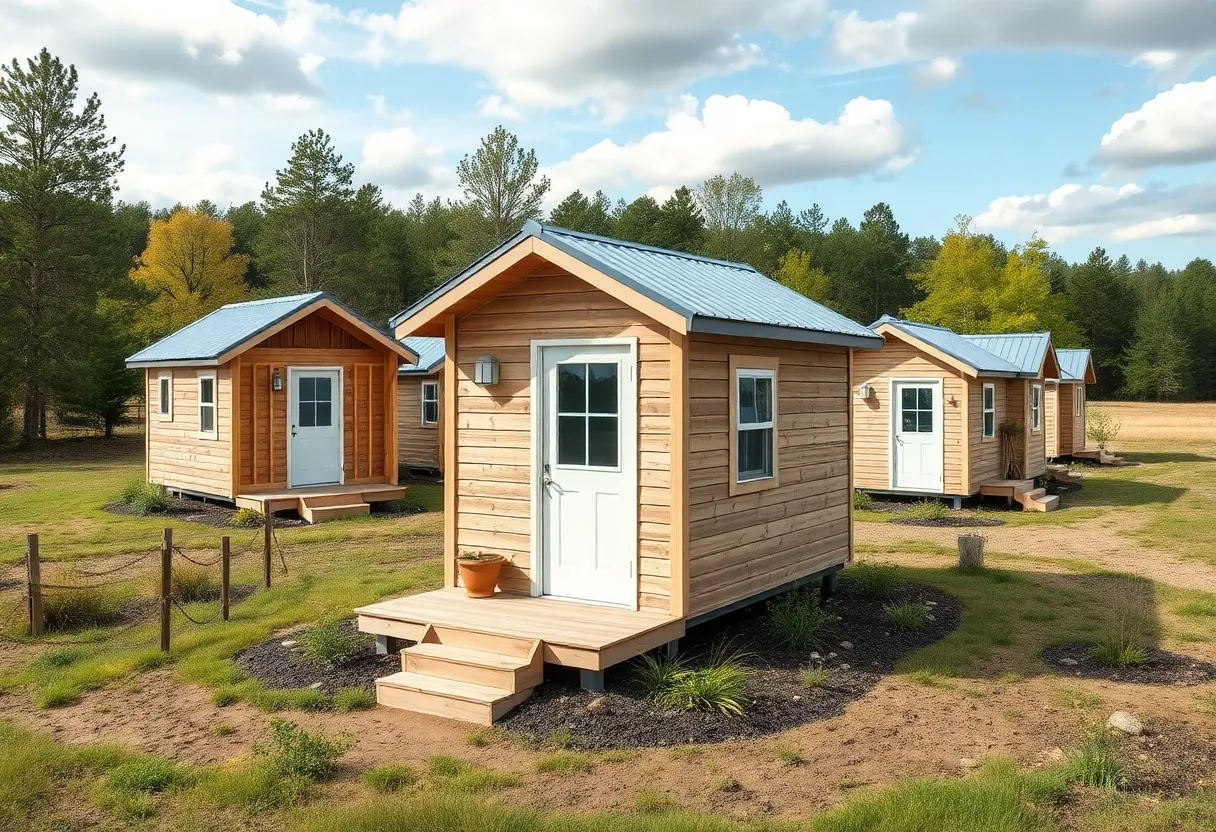News Summary
The Mountain Area Health Education Center (MAHEC) in Sylva, NC, has introduced a pioneering pilot program to combat the healthcare provider shortage in rural areas by constructing tiny homes for health sciences students. This initiative aims to provide affordable housing, enhancing training and retention of healthcare professionals. In parallel, MAHEC organized hands-on workshops for high school students to foster interest in healthcare careers. The program is expected to significantly improve recruitment and retention of medical professionals in Western North Carolina as part of MAHEC’s ongoing commitment to the region’s healthcare education.
Sylva, NC – The Mountain Area Health Education Center (MAHEC) has launched an innovative housing pilot program aimed at addressing the shortage of healthcare providers in rural Western North Carolina. This initiative includes plans for constructing tiny homes in Sylva to offer affordable housing for health sciences students, making it the first of its kind in North Carolina’s nine Area Health Education Centers (AHECs).
The need for this housing initiative stems from a significant shortage of healthcare professionals in the region. A recent report has highlighted that the area is in critical need of more medical practitioners to meet the population’s healthcare demands effectively. As part of its efforts to combat this shortage, MAHEC is focusing on improving training and retention of healthcare professionals through innovative means.
Hands-On Learning Experience for Future Healthcare Professionals
In a related effort to inspire and prepare the next generation of healthcare professionals, MAHEC held hands-on workshops on Monday for thirty high school students across nine counties in western North Carolina. Local doctors and patient actors led these workshops, which were designed to impart practical healthcare skills and experiences.
The workshop topics included essential skills such as suturing wounds, wilderness medicine, and creating first aid kits, incorporating realistic injury simulations to provide students with a diverse learning experience. Participants expressed enthusiasm for the interactive nature of the workshops, highlighting how these experiences could significantly influence their career decisions in healthcare.
Housing Just One Aspect of MAHEC’s Commitment
The tiny homes pilot program is an essential part of MAHEC’s broader commitment to supporting healthcare education and career pathways in the region. By providing affordable housing, the program aims to make it easier for health sciences students to live and train in the area, which could facilitate their decision to remain in Western North Carolina after completing their education.
Evidence of the program’s potential impact is illustrated by the plans of at least 34 medical professionals who have declared their intention to stay in the area following their residencies or fellowships with MAHEC. This marks a significant development, given the ongoing healthcare provider shortage in rural areas.
Successful Retention of Medical Graduates
Among those committed to practicing in Western North Carolina are identical twin sisters Dr. Kaydie Murphy and Dr. Krystie Murphy, who chose to focus on hospital medicine in the region after completing their internal medicine residencies. Both sisters began their training at MAHEC in 2022 after earning their Doctor of Osteopathic Medicine degrees.
As they prepare to serve patients in McDowell County and Asheville, they are part of a growing trend. Out of 16 doctors graduating with specializations in internal medicine, 10 have already pledged to remain in Western North Carolina, showcasing MAHEC’s effectiveness in retaining trained healthcare professionals in this underserved area.
Background on Healthcare Challenges in the Region
Rural Western North Carolina has long faced challenges regarding access to healthcare providers, which compromises the quality of care available to residents. MAHEC’s new housing pilot program and related initiatives are crucial components in tackling these issues by making healthcare careers more accessible and practical for students from the region. With the introduction of unique solutions, such as tiny homes for students, MAHEC is taking significant steps to ensure that more healthcare professionals will choose to live and work where they are most needed.
The concerted efforts from MAHEC reflect a dedication to not only fostering education and skill development for future healthcare professionals but also to creating a sustainable infrastructure that will support their long-term professional commitment to serving rural communities in Western North Carolina.
Deeper Dive: News & Info About This Topic
HERE Resources
Aeroflow Health Launches Philanthropic Giving Program
House Republicans Propose Massive $4.9 Trillion Tax Breaks
North Carolina Workers Rally for Change on May Day
Weaverville Prepares for the InterBeing Festival
Trump Calls Protesters ‘Paid Agitators’ in Asheville Town Hall
Asheville Community Rallies for Hurricane Helene Recovery
Asheville City Council Grapples with Funding Issues Post-Hurricane Helene
Asheville Prepares for Increased Homelessness After Hurricane Helene
Hope and Disappointment: Analyzing Trump’s Inauguration Speech and Missing Major Issues
New Developments Ignite Excitement Across Chicago: Economic Growth, Park Upgrades, and Upcoming Festivals
Additional Resources
- WLOS: MAHEC Inspires Future Healthcare Professionals
- AVL Today: MAHEC Tiny Homes Initiative
- WLOS: Rural Healthcare Provider Shortage
- HCA Healthcare Today: 2025 Impact Report
- WRAL: Raleigh Quality of Life Rankings
- Wikipedia: Healthcare in the United States
Author: STAFF HERE ASHEVILLE WRITER
The ASHEVILLE STAFF WRITER represents the experienced team at HEREAsheville.com, your go-to source for actionable local news and information in Asheville, Buncombe County, and beyond. Specializing in "news you can use," we cover essential topics like product reviews for personal and business needs, local business directories, politics, real estate trends, neighborhood insights, and state news affecting the area—with deep expertise drawn from years of dedicated reporting and strong community input, including local press releases and business updates. We deliver top reporting on high-value events such as the Asheville Bread Festival, LEAF Festival, and mountain sports tournaments at Biltmore Estate. Our coverage extends to key organizations like the Asheville Area Chamber of Commerce and Explore Asheville Convention & Visitors Bureau, plus leading businesses in hospitality and brewing that power the local economy such as the Biltmore Estate and Sierra Nevada Brewing Company. As part of the broader HERE network, including HERECharlotte.com, HEREGreensboro.com, HERERaleigh.com, and HEREOBX.com, we provide comprehensive, credible insights into North Carolina's dynamic landscape.





